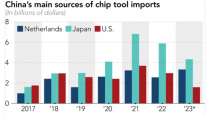Not sure if posted already, but here is a performance review of latest LoongSon desktop processor: 3A6000. The article is fairly indepth but in Chinese. Basically it is equivalent of gen 10 Intel i3 performance. This is overall performance, same amount of cores. i3 was pushed to 4ghz while LoongSon was 2.5ghz, both at their advertised clock. In other words the result is realistic, no silly caveats like using 8 cores to match 4 cores.
This is good enough for office use. I don't think it is ready for mass adoption yet despite adequate performance. There are still too much missing in the ecosystem, but it won't be long until those are stable. What is really important here is the technological basis of the processor. It is not relying on core spamming, or pushing high ghz. Achieving this result under low ghz means architecture has good design and high potential for improvement.
Up next is LoongSon 3B6000 scheduled for 2024. It will feature improvements like DDR4 > DDR5, PCIE3 > PCIE4, 4 core > 8 core. I expect the performance to be pretty good, allowing for use beyond office machines.
3B7000 processor is for post 2025. 3ghz, up to 16 cores. Supports PCIE5. I expect Zen 3 level of performance. Mass adoption by public could start here. Note, dedicated GPU will also release by this year.

